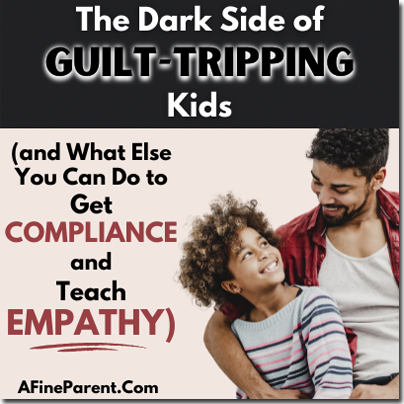 “I work all day to put a roof over your head, and you can’t even wash a few dishes?”
“I work all day to put a roof over your head, and you can’t even wash a few dishes?”
“I really thought you were more mature than that.”
“When you do that, you make me sad and disappointed. Do you really want to hurt my feelings?”
“Come ON. Don’t you know better than that?”
Do any of these sound familiar? How often do you intentionally (or unintentionally) say something like this to your kids?
A few weeks ago I told my daughter to get ready for soccer. While she is only seven, she is typically very responsive to directions and by far the most laid-back of my children. This particular day, however, she must have been bitten by the distraction bug as I found myself repeating the direction numerous times…with her still not dressed for soccer. I finally said, “Come on…I’m really disappointed that you are ignoring me and I expected more from you.”
She quickly disappeared in her room and emerged a few minutes later with her soccer uniform on… and tears in her eyes. Complete and total mom fail!
In reflecting on that moment, I realized that while my statement had the intention of jump-starting my daughter into following the direction and gaining quick compliance, it may have come with a cost. And while my intention was most certainly not to cause harm, I began to question if there could be long-term effects of using guilt-tripping as a normal method of obtaining compliance from children.
The more I thought about it, the more I wondered if this could potentially be one of the most used and unintentionally harmful methods of convincing our children to do something.
What Is Guilt-tripping?
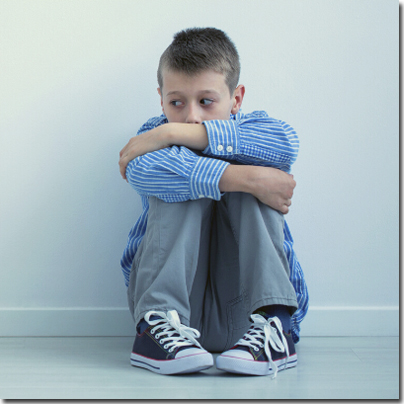 To understand what guilt-tripping is, we first need to understand the emotion that lies behind its power. Guilt is feeling responsible or regretful for a perceived offense. Guilt may be felt when we were responsible for a real offense (E.g., I was late for work and missed assisting my colleagues in completing an important project). It can also be felt when the perceived offense is imaginary, especially when presented to us by another person.
To understand what guilt-tripping is, we first need to understand the emotion that lies behind its power. Guilt is feeling responsible or regretful for a perceived offense. Guilt may be felt when we were responsible for a real offense (E.g., I was late for work and missed assisting my colleagues in completing an important project). It can also be felt when the perceived offense is imaginary, especially when presented to us by another person.
Think about how we may react when we feel guilty about something. Guilt interferes with our decision-making processes and causes us to engage in actions or refrain from actions in a different way than we normally would. Guilt can be beneficial when it is the outcome of a real offense, as it can prompt us to alter our future for the better, in order to avoid continued feelings of guilt (I changed my morning routine to ensure I would not be late for work again). When the offense is imaginary though, it can cause more harm than good.
Guilt is a powerful emotion and can therefore be a powerful tool of manipulation. Guilt-tripping is an indirect form of communication that uses shaming or blaming someone with the purpose of convincing them to comply with a request. Prolonged feelings of guilt, particularly when guilt-tripping is used on someone as a continuous manipulative tool, can lead to depression, anxiety, and paranoia.
If it’s so bad, why would we use it as a parenting technique?
It’s likely that most parents who use guilt-tripping are not fully aware of just how manipulating–and damaging–it can be. Children have an innate desire to please and when we feel helpless in controlling our child’s behavior, using guilt may feel like the only solution to getting a desired behavior. And if it works, it’s more likely that we will continue to use it.
Not to mention that a common universal parenting goal is to raise empathetic children who are aware of and in tune with the needs of those around them. As parents, it may sometimes feel like we need to teach empathy to our kids by “reminding” them of all we do for them, asking them to be grateful, and even setting up consequences when they do not apologize for perceived offenses.
How Do I Know If I Am Guilt-Tripping My Kids?
We may be using guilt-tripping as a parenting technique if we frequently find ourselves:
- pointing out our own sacrifices or efforts to call out our child on a shortcoming they demonstrated.
- making passive-aggressive or sarcastic remarks about a situation or decision our child made.
- giving our child the silent treatment.
- denying that we are upset, but engaging in actions that say otherwise.
- continuously focusing on what our child is doing “wrong” but making no effort to take ownership or to improve our own shortcomings.
- making leading remarks regarding things we did for our child or asking our child to affirm their love for us frequently.
- not able to move on from a perceived offense until our child has apologized (even if it doesn’t seem heartfelt).
It’s important to note that guilt-tripping is NOT the same as teaching our children about guilty feelings, right from wrong, or even recognizing and validating feelings of guilt they may express when they do something that does not align with their moral values or sense of fairness. Engaging in discussions about and encouraging signs of empathy is necessary to raising a healthy and compassionate human!
But It Works! Can It Really That Bad?
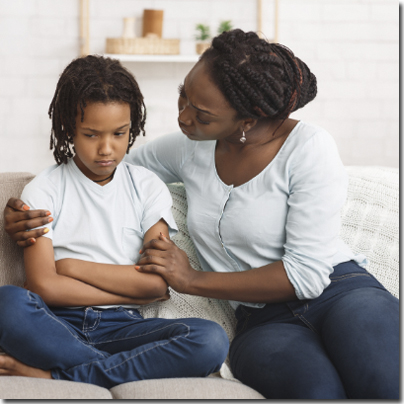 Take a second to think about a time in which you used your child’s desire to please to your advantage. It likely worked, right?
Take a second to think about a time in which you used your child’s desire to please to your advantage. It likely worked, right?
Guilt is a complicated emotion because on a scale of good-to-bad impact on behavior, it can swing both ways. The occasional use of guilt to get a child to do something we want them to do doesn’t have to involve calculated manipulation and does not necessarily do harm to an otherwise healthy relationship.
It is when guilt-tripping becomes a regular go-to parenting tactic or mode of communication that it can cause long-term harm.
Think of it this way:
- Healthy (adaptive) guilt is what we want our children to experience when they do something that does not align with their morals.
- Toxic (maladaptive) guilt is when we put our emotional baggage on our children or use guilt to manipulate their actions.
Guilt-tripping, when used as a regular mode of communication, will eventually lead to our children experiencing toxic guilt. Even when guilt-tripping is not maliciously used, it can cause psychological damage that can lead to some serious challenges and struggles as our children get older, including:
- Shutting down emotionally
- Lashing out in an attempt to gain control
- Outwardly complying while inwardly furious
- Loss of self-confidence
- Inability to maintain healthy relationships
- Feelings of resentment towards parents
- Poor school performance
- Giving into peer pressure quickly
- Feelings of obligation to stay with those who mistreat them.
Think about that last possible outcome. Feelings of obligation to stay with those who mistreat them. This doesn’t just refer to a child staying in contact with a parent who caused this type of psychological damage as they become an adult. It means that a child who experiences guilt-tripping from a parent regularly throughout their childhood is more likely to naturally gravitate towards relationships with others, outside of the parent, who treat them badly.
Sounds scary and shocking, right? The positive part here is that understanding guilt-tripping and being able to self-reflect on the way we may use it in our parenting allows us to move away from it!
How Do I Avoid Guilt-Tripping?
 The fact that you’re still reading means that you WANT to avoid using guilt-tripping as a parenting tactic. Understanding what guilt-tripping is and acknowledging how we may have used it in the past is the first step! Here are other steps we can take to avoid using guilt-tripping as a parenting tactic:
The fact that you’re still reading means that you WANT to avoid using guilt-tripping as a parenting tactic. Understanding what guilt-tripping is and acknowledging how we may have used it in the past is the first step! Here are other steps we can take to avoid using guilt-tripping as a parenting tactic:
- Understand where the desire to use guilt comes from: Parents may often find themselves most inclined to use guilt-tripping when a behavior their child has feels embarrassing or reflects poorly on them as parents. To avoid this, we can give ourselves reminders that a child’s behavior is their own responsibility… and that feeling embarrassed is our own doing. We can own our own emotions but not the actions of our children!
- Find a healthier way to communicate about desired behaviors: Often it can be helpful to revamp how expectations and limits are communicated. We can focus on describing the behavior, how it affects others, explain the consequences, and talk about a positive alternative to the behavior. (See more on this in the “Replacement Statements” section below)
- Accept feedback: Children are intuitive and once they grow old enough to articulate what they are feeling, it is likely that your child can and WILL tell you how months or years of using guilt has been hurtful. If a parent finds themselves following up their child’s words with more “proof” that their child is to blame, there is a good chance that they are in a harmful cycle of guilt-tripping. Instead, actively listening and accepting feedback (without the use of a rebuttal) can give us important information about our own behavior.
- Respect boundaries: The older our children get, the less likely guilt-tripping techniques will continue to work to obtain compliance and could actually begin to have the opposite outcome. Respecting boundaries that our children share about how they feel when we say certain things can speak volumes- and can be the start of new (and better) habits!
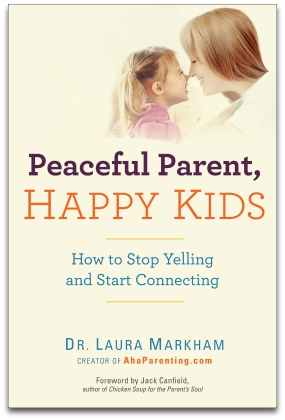 Find ways to rebuild the connection: Rebuilding connections does not need to be saved for parents who have found themselves in a guilt-tripping cycle! As Dr. Laura Markham tells us in her book, “Peaceful Parent, Happy Kids,” reconnecting after any separation (including times in which we are physically with our children but distracted from interacting), is incredibly important in maintaining connections. When we take the time to fill our child’s “attention bucket,” they become more likely to follow directions & respond to gentle guidance.
Find ways to rebuild the connection: Rebuilding connections does not need to be saved for parents who have found themselves in a guilt-tripping cycle! As Dr. Laura Markham tells us in her book, “Peaceful Parent, Happy Kids,” reconnecting after any separation (including times in which we are physically with our children but distracted from interacting), is incredibly important in maintaining connections. When we take the time to fill our child’s “attention bucket,” they become more likely to follow directions & respond to gentle guidance.
- Accept that we aren’t perfect and apologize when needed: As difficult as it can be to admit to our children that we made a mistake, modeling this behavior can go a long way. Not only does it normalize owning up to shortcomings, but it also models the healthy guilt that we want to encourage our children to feel so that they can become empathetic humans. Modeling is also a much better teaching tool for positive methods to repair harm than forcing our children to apologize for perceived offenses or hurt feelings. Even when the child’s actions were inarguably less than stellar, we need to remind ourselves that their actions are their responsibility and the feelings we experienced are ours!
When Guilt-Tripping Is a Misguided Attempt to “Teach” Empathy
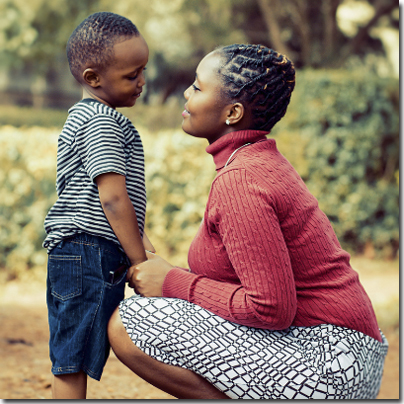 Think for a second about the following comment: “When you do that, you make me sad and disappointed. Do you really want to hurt my feelings?”
Think for a second about the following comment: “When you do that, you make me sad and disappointed. Do you really want to hurt my feelings?”
This statement has the intention of pulling on the empathy a child has towards the feelings of the adult to, in turn, elicit guilt that will change behavior. However, in using this kind of a statement, we give a few likely unintentional messages:
- The child is responsible for the parents’ feelings (they are not)
- The child should already feel empathetic to the parents’ feelings in order for the statement to work to change behavior (they may not)
- The parent cares more about their own feelings being hurt than the feelings of the child (modeling the opposite of empathy)
So how can we better model and teach empathy while avoiding guilt-tripping?
Here are two great strategies to try out:
Commit to Replacement Statements
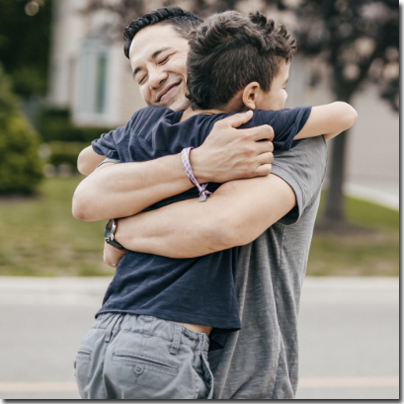 After reflecting on the statements that we may make to elicit guilt in our children (write them down!), we can decide on and commit to replacement statements. Some common guilt-tripping statements and replacements may include:
After reflecting on the statements that we may make to elicit guilt in our children (write them down!), we can decide on and commit to replacement statements. Some common guilt-tripping statements and replacements may include:
- Instead of “I did _____ for you, you can’t even do _____ for me?” try “You have a lot of responsibilities, don’t you? Maybe we can brainstorm a way together to help you better remember all of them.”
- Instead of “You don’t want to (family activity you want them to participate in)? That makes me feel like you don’t love us,” try, “I know you may not want to join us right now but it’s important that we do this as a family. Maybe next time you can pick the activity!”
- Instead of “When you do that it makes me sad and disappointed” try “Let’s talk about what is expected and what you need from me to be able to do it.”
Try Gratitude Rituals
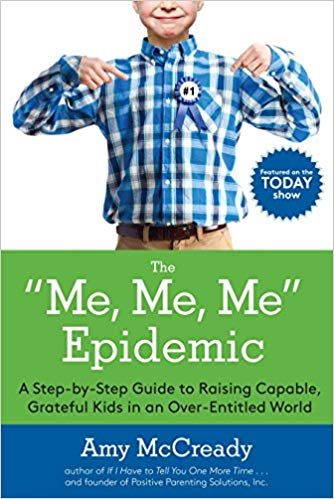 Proposed by Amy McCready in her book “The Me, Me, Me Epidemic,” gratitude rituals are a tool to help our children get into the habit of looking for things to be grateful for. Encouraging an un-entitlement within the home lends itself to raising children who can look past themselves to the needs and emotions of others. Here’s how to put to use gratitude rituals:
Proposed by Amy McCready in her book “The Me, Me, Me Epidemic,” gratitude rituals are a tool to help our children get into the habit of looking for things to be grateful for. Encouraging an un-entitlement within the home lends itself to raising children who can look past themselves to the needs and emotions of others. Here’s how to put to use gratitude rituals:
- Set the scene: Decide when and how there can be a deliberate and consistent time for the family to express gratitude. This could be during dinner, at bedtime, during bath, or first thing in the morning. Commit to that time frame!
- Introduce the idea: Share the concept of a gratitude ritual with the family. Depending on the ages of children in your family, this may come in the form of a family discussion, giving examples, or even reading a book about gratitude and what it means.
- Practice the script: Take the lead for the first few Gratitude Rituals by going first and giving a specific example of something you are grateful for. Make sure to model the wording and detail that you want your children to follow suit with! For example “I’m grateful that grandma is feeling better and that we can go and see her this weekend.”
- Revisit the ritual: Remember that human behavior takes a long time of repeated trials before it becomes a habit. Make the commitment as a family to hold each other accountable and to stay consistent in the family Gratitude Ritual.
 Do you want to hear more about how to raise children to be empathetic humans? We partnered with Amy McCready, a Certified Positive Discipline Instructor and best-selling author, to find out more about the solution to the “entitlement epidemic,” and to better understand how to set up limits with consequences in a way that encourages responsible behaviorThis packed masterclass is one of the 60+ masterclasses you get when you join the AFineParent Academy today. Click here to learn more.
Do you want to hear more about how to raise children to be empathetic humans? We partnered with Amy McCready, a Certified Positive Discipline Instructor and best-selling author, to find out more about the solution to the “entitlement epidemic,” and to better understand how to set up limits with consequences in a way that encourages responsible behaviorThis packed masterclass is one of the 60+ masterclasses you get when you join the AFineParent Academy today. Click here to learn more.I have personally found that I have to remain vigilant and cognizant of the guilt-tripping statements I use in order to replace them with more positive and supportive options. With the right mindset, we can all be more aware of how we have used guilt-tripping to gain compliance and teach empathy. With this awareness, we can begin to make the change needed to avoid the long-term damage that can come when our children experience toxic guilt while still encouraging compliance and teaching empathy. You’ve got this!
The 2-Minute Action Plan for Fine Parents
Take a few minutes to self-reflect on your own use of guilt-tripping in the past. Write down responses for the following:
- What statements do I know that I use that could be guilt-tripping?
- What are the behaviors I’m usually addressing and why do they bother me so much?
- What could be positive replacement statements that I am willing to commit to?
The Ongoing Action Plan for Fine Parents
You took two minutes to reflect on your own use of guilt-tripping and decide upon some replacement statements- great job! As you move forward from here, print out or write down the steps to avoiding guilt-tripping and decide on how a commitment to these steps will look for you and your children. Consider these questions and come back to them often over the next few weeks:
- How can I remind myself to be an active listener and allow my child to give me feedback? Is it helpful to journal about the feedback my child gives me so that I can use it as a reminder later?
- What work do I need to do on myself to better understand WHY I use guilt-tripping statements? What prompts can I put in place to remind myself of these at the moment?
- How am I communicating behavior expectations to my child; and am I being clear and concise or do I need to provide better clarification?
- Am I taking the time to rebuild connections with my children on a normal basis? Do I need to commit to a time period every day to put down electronics and give my child my full attention?
- How is my family going to commit to Gratitude Rituals- what will it look like and when we will do it? How can we hold each other accountable for continuing this?


My dad did this to us whenever we “got in trouble”, aka, being 5 minutes late to curfew, drinking, doing normal teenage things. It was all about him, his feelings, how we made him so upset. He would lecture for literally 3 hours while we (I) cowered on the couch just praying for him to finish and let me go to my room. It wa horrible. I would have easily preferred a whipping. I learned years ago that HE was severely traumatized, but he never sought any help until the last 20 years or so. and he rejected that. I love him so much and he is an amazing person and father but back in the day when he was younger. he didn’t realize how harmful his “lectures” were. He offered no help, no ways out, no redemption, just guilt and shame and his favorite catchphrase (whenever it had anything to do with boys) “You’re going to ruin your life!” Now I know that his own mother “ruined her life” by having kids really young and being dirt poor and he was the last one. He literally heard her crying about having another kid that she wished she hadn’t. HE NEEDS THERAPY and I wish to god he could get it. I have no ill feelings toward him at all, but looking at my current life, I am divorced and I have NEVER had a successful. happy relationship. I’m 52 and I probably never will. I hope you can get your message out to more parents and children.
Breaking the unintentional cycle of how many of us were communicated to as children by one or both parents can be a daunting task ( as I am currently undergoing a shift in my communication via parenting rituals) but this was an insightful and informative article that I will pass on to all that have children.
Thank you, Jordan! And great for you, working on your own communication in parenting! =)
Wow I just went thru a situation i didnt understand and my kid called me out on guilt tripping. I’m glad I came across your blog really helpful advice. Thank you
Beautifully written with an insightful message about the topic. Also some good suggestions there about how to avoid making your kids feel guilty even though it’s unintentional as a parent. Replacement statement section is really good. Thanks
Thanks Salil! I think we are all guilty (ha!) of using guilt-tripping at some point- most likely unintentional. Thanks for reading!